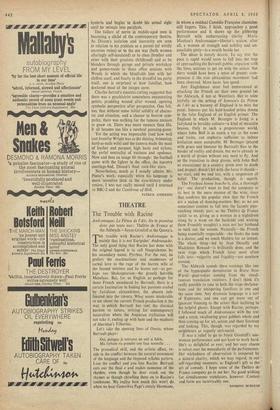I seem to have met Bernard Kops's novel before--in the
compacter form of a television play. Yes front No-man's Land is not fat, how- ever; it is no blown-up dramatic anecdote. Joe I.evene lies in bed in hospital,- dying, though unaware of it, and he relives the life of a Jew in England .who, through the vicissitudes of pri- vate and public history, has won through to a sort of faith—in God, but also in the sense of an emergent pattern: 'Life is sweet. I've had my ups and downs but on the whole I mustn't grumble.' The young of his own family, who seem to have no belief in anything, worry him : there is no creative dialectic in the easy future they face. But by engaging with great odds, Joe has achieved sweetness. After death the odds are gone, but death's imminence is, paradoxically, part of life's dialectic. He is a well-wrought character and the style- -which catches exactly the extremes of mood engendered by his illness
-has a powerful and idiosyncratic unity under the remarkable variety of tone.
ANTHONY BURGI:SS
Vale
The Man with the Golden Gun. By Ian Fleming. (Jonathan Cape, 18s.)
The Man with the Golden Gun, I suppose. must be Bond's last ride. Although it is far from being his bravest or his best, he canters along briskly enough and as usual •discovers for us several treats by the way in the form of privi- leged if mildly dubious information. Did you know, for example, that many champion tennis players et al. believe firmly in having sexual intercourse just before their big matches, on the ground that it steadies the eye? This point is made a propos of the gunman, 'Pistols' 'Scaramanga,. who totes a gold-plated revolver as a symbolic 'penis-extension' and is deservedly the terror of the Caribbean, having blasted his only possible rival, Ramon The Rod' Rodriguez, in a moonlight duel on the third green of the Thunderbird Golf Course. Since he has also rubbed out several of M's best men, to say nothing of all his dirty work for Cuban Uncle Fidel, it is decided that 'Pistols' must noW be 'taken,' a near-suicidal project which is allotted to Bond as a punishment for having tried to kill M, while under the influence of the KGB's brainwashing, with a water-pistol full of acid.
So now read on. Construction is patchy and both sides get away with incompetence which would have been unthinkable or immediately fatal a few years earlier in Bond's career; but this book is never boring, and includes an imaginative cabaret, instructions how to prepare and eat a raw snake, and some amusing busi- ness with an old-fashioned virgin tied to a railway line. Only when Bond is threatened, in the last few pages, with both knighthood and matrimony, is it clear that things are finally running down. Ah well; another good man gone.
_ SIMON RAVEN
The Great Game
'rhe Cold War—A Reappraisal. Edited by Evan Luard. (Thames and Hudson, 42s.) South-East Asia In Turmoil. By Brian Crozier. (Penguin Special, 3s. 6d.) Neo-Colonialism. By Brian Crozier. (Bodley Head, 10s. 6d.) The Third World in Soviet Perspective : Studies by Soviet Authors on the Developing Areas. Edited by Thomas Perry Thornton. (0.U.P., 60s.) THAT the cold- war is not what it was in Stalin's day has 'become a truism which has frequently come to be used to ward off frank evaluation of what the cold war actually is under Stalin's heirs. This in itself makes a cool look at the evolution of the cold war timely, quite apart from the need for assessment of post-war political strategy under Stalin, Malenkov and Khrush- chev as ,a bench-mark against which to gauge the present Soviet government's actions.
But The Cold War---A Reappraisal, in spite of the individual excellence of many of its con- tributors, is a disappointing book. Some of its shortcomings stem inescapably from the fact that it is written as a symposium by twelve separate contributors, each dealing with his own area or subject. Some have produced highly informative essays, but they are not collated to provide .a balanced assessment. The symposium's .editdr, Evan Luard, who might have been expected to pull the threads together, is the weakest link and writes at cross-purposes to the sense of most contributions. His introduction and summary essay sacrifice realism for the sake of symmetry. In order to adduce all possible parallels between
the Atlantic Alliance and the Communist bloc in their nature and evolution, which seems to be his major preoccupation, he ignores the basic differences. Stalin is equated with Dulles, Com- munist polycentrisrn with changes in the nature of the western alliance, the desire in the West to see democracy flourish and the eventual re- moval of Russian-imposed governments with Soviet and Chinese efforts to extend Com- munism: 'For a considerable period today, how- ever, the Soviet leaders appear to have recog- nised its [the duty of Communist parties and governments to promote and support revolution
all over the world] dangers. They have de- nounced. the "export of revolutions." The Comin- tern and its Successor hme been disbanded.'






































 Previous page
Previous page